Critical Research Unlocks Learning Opportunities: Five Hardie Fellows Discuss Their Projects
by Tom Hanlon / Sep 12, 2023
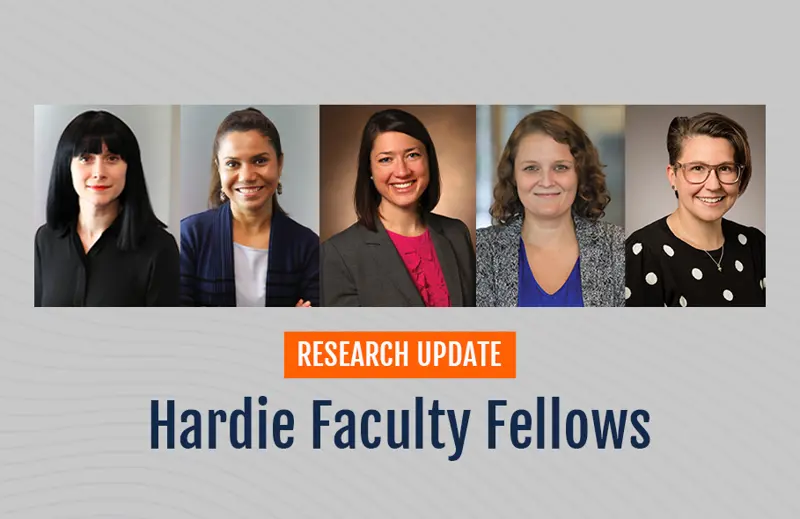
Four assistant professors and one teaching assistant professor have been conducting research this past year that has been funded in part by the Charles Dunn Hardie Trust Fund. Following is a look at their work as Hardie Faculty Fellows.
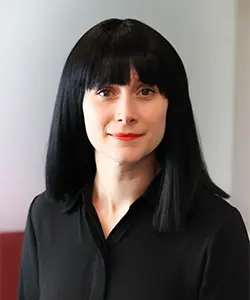
Helping Families Discover and Talk About Science
Catherine Dornfeld Tissenbaum | Assistant Professor
Curriculum & Instruction
"We have created a mobile science learning experience for families visiting Russell Woods Forests Preserve in DeKalb County through a partnership with Peggy Doty at UI Extension," Dornfeld Tissenbaum says. "The website features generic scaffolds to support families' talk about science in the outdoors, along with age-specific topics and sample questions to help parents pick appropriate topics to discuss with their children and teens."
The site also has preserved information, highlights, and links to resources focusing on hiking and exploring bird and plant identification and science projects.
The website was developed with support from Dornfeld Tissenbaum's doctoral student, McKenna Lane, and Bryan Jonker, who works with IT Partners at the College of Education. "Bryan helped me to set up data analytics for the website," she says. "This enables us to triangulate users' actions on the website with qualitative findings from interviews and observational data. I want to express my thanks to Bryan for getting the data analytics set up, as I learned that this was an ambitious project for his team that will facilitate future data-logging projects other than my own."
Besides helping families engage in more science talk while exploring the outdoors, Dornfeld Tissenbaum studies how and when families leverage the scaffolds embedded in the experience to deepen science learning in self-directed ways.
"This is a pilot for a future NSF [National Science Foundation] proposal that will aim to develop a flexible 'skeleton' of a mobile experience with embedded scaffolds that can be adapted for other informal learning spaces with minimal programming experience," Dornfeld Tissenbaum says. "I hope that other parks, museums, and zoos might use the basic premise of this technology to create simple, accessible experiences for families."
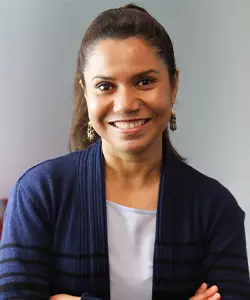
Mediating Culture in Dual Language Classrooms
Giselle Martinez Negrette | Assistant Professor
Curriculum & Instruction
"My project explores how teachers mediate culture in dual language classrooms and how this mediation impacts teaching practices and social interactions between teachers and students," Martinez Negrette says. "This may take place in various teaching actions, such as the way teachers arrange cultural activities or select classroom materials. DL teachers, guiding the learning process in their linguistically and culturally diverse classrooms, play a vital role in bringing visibility to the cultural diversity within themselves, their students, and their communities."
Raising the awareness of diversity issues has fueled meaningful conversations in educational contexts (e.g., #BlackLivesMatter, #stopAsianHate, #NotYourMascot). "In the case of DL programs, sociocultural distinctions take on a more pronounced role because the goal of these learning environments is to support intercultural connections, bilingualism, biliteracy, and mutual respect for diversity," Martinez Negrette says.
Her study explores how notions of culture, identity, diversity, and language develop and intersect in the focal settings, providing educators with opportunities to examine these intersections deeply.
"The goal of this study is to create a space for authentic, reciprocal collaboration where educators, as the community partners, can use the data collected in the classroom to engage in self-reflection and work with the research team to better understand the role of culture in their interactions and teaching practices," she says. "This understanding will be helpful to develop culturally and linguistically responsive pedagogical practices to effectively support learning in DL contexts."
She believes her study will benefit the local school community in two ways. "First, it will provide educators with critical evidence, space, and time to consider their roles as cultural mediators in school contexts and DL programs. And second, it will provide classroom data that will be useful in designing teachers' professional development to support educators in the school community," Martinez Negrette says.
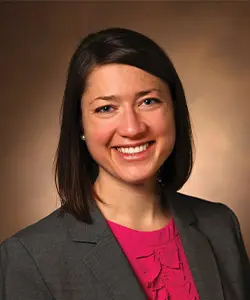
How Reorganization Affects Workplace Dynamics in Educational Settings
Jennifer Nelson | Assistant Professor
Education Policy, Organization and Leadership
"I'm investigating how long reorganization periods in an educational organization affect its internal workplace dynamics, using an academic library within a university setting as an illustrative case," Nelson says.
Current research on educational change, the purpose of education, and just learning environments pinpoint that professional and workplace dynamics of educational institutions are vital in implementing change as well as reflecting and facilitating an inclusive organizational climate for students, she says.
"I want to show how processes of structural change and systemic issues of equity in the educational workplace are mutually constituted," Nelson notes. "I am examining how multiple and different organizational changes within one time period affect professionals' work processes and experiences, especially as they relate to fair working conditions for faculty and staff. This study contributes to educational research on change and equity, highlighting how these are related, overlapping, and sometimes conflicting organizational goals."
Nelson hopes to publish her research in organizational journals, to expand her interdisciplinary reach, and to contribute useful, applicable knowledge to the field of library science, specifically regarding insights for operating academic libraries as organizations.
"I am in the throes of data analysis and have presented an early version of the first analysis at one conference," she says. "To strengthen my evidence about how change unfolds and affects employees over time, I plan to follow up in a second wave of observations and interviews with the support of a BER [Bureau of Educational Research] seed grant.
"I can't say strongly enough how much this fellowship has meant to me. It enabled me time to engage in the time-intensive work of face-to-face, day-to-day ethnographic observations and interview data collection for half of a semester."
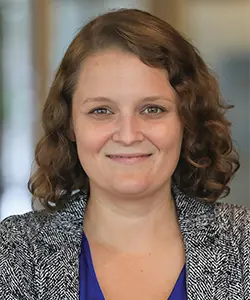 Incarcerated People, Higher Education, and Justice Rebecca Taylor | Assistant Professor
Incarcerated People, Higher Education, and Justice Rebecca Taylor | Assistant ProfessorEducation Policy, Organization and Leadership
"College and university decisions about whether and how to serve students with experiences of incarceration have wide-reaching impacts across U.S. communities," Taylor says. "Scholars and advocates have demonstrated that excluding this population from undergraduate and graduate education perpetuates racial and economic disparities."
Taylor's project "Epistemic Carcerality and Resistance in Higher Education" examines how epistemic injustice is experienced by currently and formerly incarcerated individuals in higher education contexts and the forms of resistance they employ to gain access and legitimacy.
"We are using the epistemic justice framework to, one, develop a philosophical account of epistemic carcerality, a form of epistemic oppression impacting currently and formerly incarcerated people; two, anchor a qualitative, case-based study of incarcerated college students and educators in a prison college program; and three, develop a special issue further exploring the ramifications of epistemic carcerality for current and prospective students with conviction histories," she says.
Less attention has been given to the uniquely epistemic forms of injustice experienced by currently and formerly incarcerated people in higher education contexts, forms of injustice that also disproportionately impact low-income and people of color, Taylor says.
"Epistemic injustice occurs when people are mistreated in their capacities as knowers, as participants in communicative practices that inform our collective resources of knowledge and understanding," Taylor notes.
She will coauthor two scholarly articles and co-edit the special issue. She and her co-principal investigator, Nicole Lindahl-Ruiz from Willamette University, are engaging collaborators with diverse disciplinary foundations and expertise in higher education and the criminal legal system, including scholars with direct experience of incarceration, to participate in a workshop series.
"The fellowship support has enabled me to dedicate concentrated time to this project this summer and to hire a graduate research assistant to support the project's development," Taylor says.
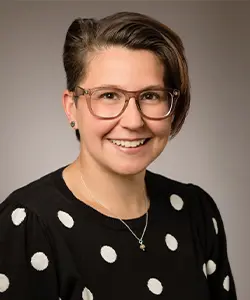
Online Training for Special Education Paraprofessionals
Kary Zarate | Teaching Assistant Professor
Special Education
"My project has two aims," Zarate says. "The first is to understand if an online training package for special education paraprofessionals is successful in helping them acquire teaching skills and if those skills learned in the remote setting transfer to real-life work with students. The second aim focuses on the skills taught in the training."
Those skills, she says, include learning how to collect data on student behavior accurately.
"So many of the educational decisions made in schools rely on data; however, paraprofessionals are not typically taught how to collect this data accurately," Zarate explains. "If we make important decisions based on student data, we better be sure that data is correct!"
The paraprofessionals in her study are learning how to collect data through short and efficient digital training that is done asynchronously so that it can fit into their day and is less reliant on teacher and researcher support. "I hope this research can tell us if this mechanism for training is feasible for schools and if it is successful in creating transferable skills," Zarate says.
The project, a small-scale randomized control trial that includes 40 paraprofessionals from local schools, launched this fall.
"I'm so grateful to have had this opportunity!" she says.